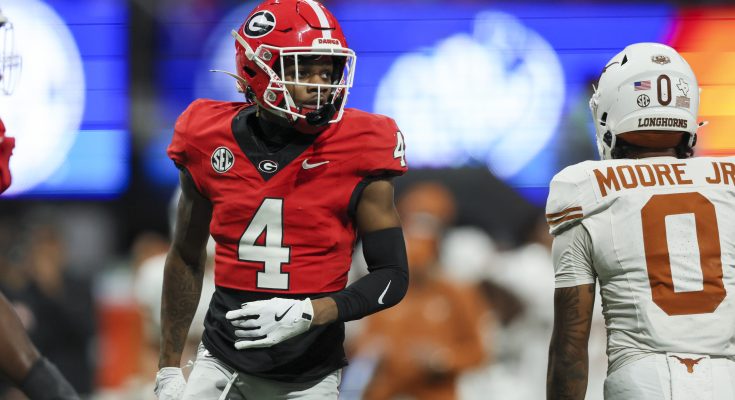It’s no secret that the Texas Longhorns are the darlings of the college football hype cycle heading into the 2025 season. With a high-profile move to the SEC now fully underway, a talented quarterback room led by Arch Manning, and a fanbase eager to return to national relevance, many have been quick to declare Texas the next superpower in the nation’s most grueling football conference. But before anyone starts carving their name into the college football Mount Rushmore, they may want to take a closer look at what Kirby Smart and the Georgia Bulldogs are quietly continuing to build in Athens. Because while headlines, recruiting buzz, and conference movement may be catching the spotlight, the All-SEC rosters and the all-important Blue-Chip Ratio suggest that Georgia remains the most talent-rich and dangerous team in the league.
Every offseason, the Blue-Chip Ratio becomes one of the clearest indicators of which teams can realistically win a national championship. Coined by 247Sports’ Bud Elliott, the Blue-Chip Ratio measures the percentage of a team’s signees over a four-year period who were rated as four- or five-star recruits. Elliott’s rule is simple: If your team doesn’t meet a 50% Blue-Chip Ratio, it’s not winning a national title. In 2025, Georgia once again finds itself near the top of that list. With a staggering 88% of its roster composed of blue-chip recruits, Georgia is tied with Alabama for the highest ratio in the country. Texas, for all its hype, sits at a respectable—but not comparable—71%. That’s still elite. But it’s a significant gap from Georgia’s war chest of talent.
Furthermore, the 2025 preseason All-SEC selections tell a story of experience and dominance that shouldn’t be overlooked. Georgia placed a nation-leading number of players on the list, with stars on both sides of the ball recognized for their elite play. Names like Malaki Starks, Mykel Williams, and Tate Ratledge aren’t just preseason hype—they’re proven game-wreckers who have shown they can dominate in the trenches and in the backfield. In contrast, Texas’ All-SEC selections, while impressive, skew younger and more projection-based. Arch Manning may be the future, but he still has to prove himself against the best defenses in America. Meanwhile, Georgia’s defense has been producing NFL starters at an assembly line pace, and that trend doesn’t seem to be slowing down.
Another factor being overlooked in this rush to crown Texas is the matter of depth. Injuries and attrition are an inevitable part of an SEC campaign. Georgia’s dominance over the last three years has been built not only on five-star starters but five-star backups. When players like Brock Bowers, Jalen Carter, or Jamon Dumas-Johnson have gone down, Kirby Smart’s system has continued without much drop-off. That’s what separates great teams from championship dynasties. Texas may have stars at the top, but depth is still developing—especially in the trenches, where the SEC lives and breathes. The Longhorns’ offensive and defensive lines will be tested weekly in a way the Big 12 never prepared them for. Georgia, on the other hand, has spent the last half-decade sharpening its blade in that very crucible.
Beyond the numbers, there’s the matter of culture and expectation. Georgia isn’t just playing for playoff berths anymore; they’re chasing immortality. Since their first title under Kirby Smart in 2021, the Bulldogs have become synonymous with postseason excellence. Even in a 2024 campaign that fell short of another national championship, Georgia remained a terrifying opponent and reloaded rather than rebuilt. Texas, by contrast, is still working to restore the glory days of Vince Young and Colt McCoy. Last season’s playoff appearance was a major step forward, but it remains to be seen whether it was the beginning of a new era or a flash in the pan.
Let’s also not overlook coaching stability and identity. Kirby Smart has built Georgia in the image of the modern SEC dynasty: relentless defense, dominant line play, and elite recruiting. Every season, his Bulldogs are one of the most physical, disciplined, and tactically sound teams in the nation. The assistants behind him—from Glenn Schumann to Dell McGee—are consistent and elite in their development of talent. Steve Sarkisian deserves credit for what he’s accomplished in Austin, but his track record doesn’t yet match the sustained excellence Smart has brought to Athens. And in the brutal cauldron of the SEC, where one misstep can cost you a division title, coaching continuity matters immensely.
Texas’s arrival in the SEC is exciting, make no mistake. They bring money, tradition, and an energized fanbase to an already elite league. But the notion that they’re poised to leapfrog a battle-tested, deeply talented Georgia program feels premature. When it comes to recruiting, player development, and postseason readiness, the Bulldogs are still operating on another level. And they’re doing it without the constant national hype machine that seems to orbit around Texas every offseason.
What’s most telling is how Georgia players carry themselves. There’s no need for loud declarations or bulletin-board material. The Bulldogs have let their play do the talking, and it’s spoken volumes. They’ve won two of the last four national championships, made the College Football Playoff multiple times, and consistently dominated the SEC East. While the division is now gone under the new format, Georgia’s trajectory hasn’t shifted. They are the program others are trying to catch—not the other way around.
And for all the attention on Texas and their high-octane offense, Georgia’s unit under Mike Bobo continues to evolve. With Carson Beck returning at quarterback, a veteran offensive line, and a wealth of playmakers, Georgia may have its most balanced offensive attack yet. They won’t just suffocate teams with defense—they can score 40+ on any given Saturday. That balance is something Texas still has to prove it can maintain, especially once the hits start piling up in SEC play.
All of this isn’t to dismiss Texas’s potential. They’ve earned the right to be in the conversation. But college football doesn’t hand out championships based on momentum or media buzz. It awards them based on rosters stacked with elite players, depth that can weather the storm, and cultures built on consistency. Right now, Georgia still checks every single one of those boxes.
The Blue-Chip Ratio reminds us who has the talent advantage. The All-SEC teams tell us who the best players are right now. And Georgia, by every measurable standard, still reigns supreme. Texas may be coming—but Georgia never left.
So before we crown a new SEC king, maybe we ought to look at who’s still sitting on the throne.



